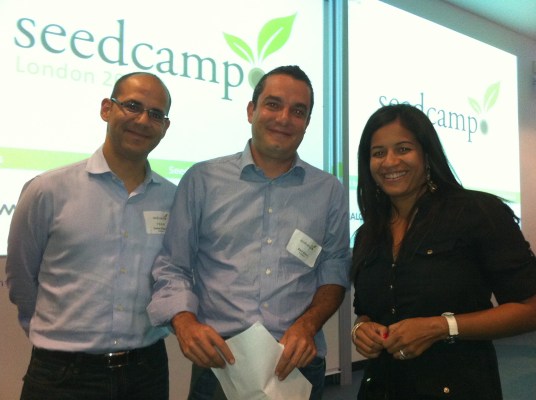Seedcamp, the former accelerator (I’ll explain why later) which helped kick start the European startup scene seven years ago, has announced it’s third fund with a first close of $28M – the eventual aim is for around the $30M mark. This is to scale its seed investing across Europe and build its US presence. When I say build its US presence, what they actually mean is that Seedcamp will have a very large presence in the US from now on and plans to spend roughly 50% of its time there, acting as a full—blown bridge between US and the European tech scene to take its startups global.
The fund raise also continues the European trend of raising money from government/public funds. Some 49.9% of this first close of $28M is coming from the European Investment Fund, set up to invest in venture capital. The rest has come from private investors, including many entrepreneurs who have previously gone though the Seedcamp programme. They are clearly voting with their feet.
The list of investors is (alphabetically):
Alex Gerko (Angel, part of Octopus Ventures, YC investor)
Anthemis Capital
Barry Smith of Skyscanner (Angel)
Caixa Capital
Connect Ventures
Credo Ventures
David Archer (Angel, part of Octopus Ventures)
DC Thomson Ventures
European Investment Fund
Fidelity Growth Partners
Foley Lardner (Angel)
Hays Recruitment
Index Ventures
Johan Brenner (Angel, Partner at Creandum)
Karel Obluk (AVG) (Angel)
Octopus Ventures
Real Ventures
REP Advisors (Angel)
Richard Chen (Angel, China based)
Smedvig Capital
Sten Tamkivi (Co-founder & CEO at Teleport and EIR at Andreesen Horowitz)
Supremum Capital
Taavet Hinrikus (Transferwise) (Angel)
Tushita Ranchan (Angel)
Venrex Capital
White Star Capital
Yandex Capital
These investors range from China, Russia, Europe and the Valley, though there are one or two absences such as Atlas Ventures which invested in the first Seedcamp Fund, but which is now US-only.
They call this new iteration ‘Seedcamp 2.0’ – with the aim of backing 100 ventures over the next four years towards creating $1B businesses from across Europe, most of which will achieve that by scaling up in the US.
Seedcamp co-CEOs Reshma Sohoni and Carlos Espinal believe that Europe now has a different set of problems than it did seven years ago.
Then, Seedcamp was a traditional accelerator, pumping cash into a handful of startups, with a three-month bootcamp programme.
It went on to effectively built its own eco-system within the very early stage ecosystem of Europe – although, in 2007 Seedcamp practically WAS the early stage European ecosystem.
True enough, 7 years ago was a very different time. There was almost no European tech startup media (apart from myself at TechCrunch) and only Skype and MySql as breakout hits. As Index’s Saul Klein, creator of Seedcamp, says, there was no Google Campus, Facebook platform, no Amazon S3, no micro VC and no super angels.
Now, there are so many sources of early funds, from the mushrooming number of accelerators like Tech Stars London and Startup Bootcamp, that just starting up – the ‘Art of the Start’ – is now a problem that is pretty much fixed.
But ‘Scaleup’ type startups are much less well served, and this is where Seedcamp, with its new fund, thinks it can step in. (Although it’s not leaving early stage by any means, as it will still distribute funds from 25k to 250k).
Seedcamp is, to some-extent, an outsourced deal flow funnel for its institutional investors. It’s not an accelerator any more – it’s a venture acceleration fund, or perhaps venture acceleration platform.
It creates this platform via it’s myriad events – 80 events with 10,000 startups, 5,000 mentors, and, to date, 120 Seedcamp companies. It then takes these companies on a much longer journey, often lasting years.
While it wraps its investments in a warm embrace of learning and a stellar mentor network, it’s this conduit to the bigger funds that gives it an edge few others have.
Commenting on the move, Nic Brisbourne, managing director of Forward Partners commented, “they are right to want to put more money into their startups. The old model of three months worth of money doesn’t give companies much time to make meaningful progress. Seedcamp’s greatest strength is their amazing network and the way they work it for their companies. They say they are going to evolve their model and I imagine that will be by building additional capabilities around their core strength.”
However, his view is that “the next evolution in startup financing is to offer operational assistance as well as cash and access to networks,” or the investment studio model.
A serial investor who preferred to remain unnamed, commented, “Well done to seedcamp because the question was always two fold. Firstly, who would fund them because their traditional investors were angels and VCs who saw them as good deal flow marketing. Neither are suited in the new fund. Indeed VCs would see them as more competitive. They have obviously overcome this challenge. I’m not sure whom the investors are today.
Secondly, it’s very different to go from community based mentoring, events and relationship based support to portfolio companies, the old Seedcamp, to a structured programmatic approach to portfolio company operational support. Today most venture funds recognise it’s a VC job to not just invest and exit but actually create value in portfolios beyond a roladex however very few have been able to figure out how at scale.
Whatever the case, Seedcamp has realised that the first $75,000 investment and a three-month program to support what might be a $10m business is “not good enough anymore”. Now, it’s about super-charging a startup with $200,000, $2M, and then $20M of investment, via it’s LPS, then going on to create $1B businesses.
That’s the game-changer here. And with the like of Google Ventures and others launching new European funds, there is everything to play for.
